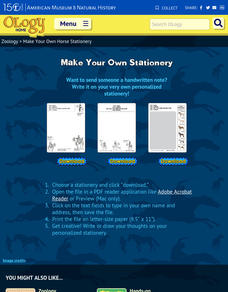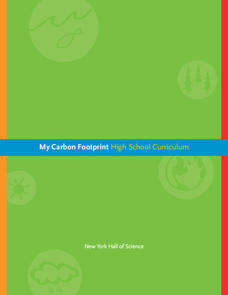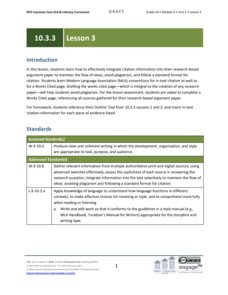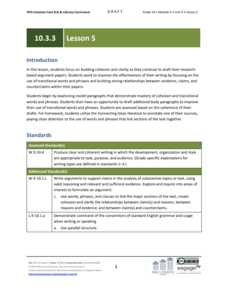British Council
Buy. Use. Toss.
Responsible consumption is never a waste of time. Using the engaging resource, scholars learn about the impact of waste on the planet, sorting trash into necessary and luxury piles. They then analyze their consumption habits, writing an...
Texas Education Agency (TEA)
Legal Responsibilities of Financial Exchanges
Let's stock up on knowledge! With lecture and discussion, pupils explore the legal responsibilities of monetary exchange. Scholars then research laws about financial exchange in the stock market and create a poster to illustrate their...
Workforce Solutions
Thank You Letters
An important step in the job search process is sending a thank you note to any professional that has been of help. First, pupils discuss the etiquette of thank you notes, then draft a practice letter.
Texas Education Agency (TEA)
Business Document Formatting
Pupils learn about the various types of business documents and discover how to enhance them using word processing tools. Next, they respond to hypothetical business scenarios by writing professional letters.
American Museum of Natural History
Make Your Own Marine Biology Stationary
Encourage letter writing with marine biology-themed stationary. Three versions showcase a variety of underwater creatures.
American Museum of Natural History
Make Your Own Horse Stationary
Write a letter on horse-themed stationery. Three pages to choose from showcase a variety of horses and the history of horseback riding.
Texas Education Agency (TEA)
Careers in Department of Transportation
Cars, planes, and trains, oh my! Using the informative resource, scholars expand their knowledge about transportation-related careers. As a culminating activity, pupils research and present on a chosen agency within the Department of...
American Museum of Natural History
Make Your Own Astronomy Stationary
Scholars follow five steps to create personalized, astronomy-themed stationary.
American Museum of Natural History
Make Your Own Earth Stationary
Scholars follow five steps to make personalized Earth-themed stationary. Personalization includes name and returns address.
American Museum of Natural History
Make Your Own Dino Stationary
Scholars follow five steps to create dinosaur-themed stationery using basic computer skills.
J. Paul Getty Trust
Exhibiting Common Threads
Artists working in different media often explore the same themes—to model how these same themes weave their way through different forms of artistic expression, scholars analyze images by Dorothea Lange, identifying key themes in her...
University of Wisconsin
Don Quixote in Wisconsin
Are you looking for background information on Cervantes and his Don Quixote? How about a study guide and discussion questions or project ideas? Even journal prompts, tests, and quizzes? A 98-page teaching guide simplifies the quest with...
Learning to Give
Deliver Gratitude Day
Gratitude is the focus of a discussion that sets the stage for pupils to take part in a service-learning project in which they deliver notes of kindness by way of social media or mail. A reflection closes the learning experience.
Council for the Curriculum, Examinations and Assessment
Managing Influences and Making Decisions
Does patience help people become more responsible? Class members explore the topic with a What's It To Do With Me? quiz to assess their personal responsibilities. They engage in a whole-class discussion about pros and cons of instant...
New York Hall of Science
My Carbon Footprint: High School Curriculum
The earth has a love-hate relationship with carbon. Learners complete a series of nine lessons that begin with an examination of the role of carbon in Earth's systems. They then relate changes in climate and weather to changes in the...
PBS
Extranjeros and Expansion
A three-part lesson gives light to the Unites States expansion from the view of Texans, New Mexicans, and Californians. Through videos and written activities, scholars work collaboratively to research specific individuals and their...
PBS
Latino Americans Share Their Experiences
Three Latino Americans are the focus of an interactive that spotlights their accomplishments. Scholars get to know Lin-Manuel Miranda, Judy Reyes, and José Hernández through short informative text and videos. Participants read, take...
EngageNY
Grade 10 ELA Module 3: Unit 3, Lesson 11
It's time to show what you know. Scholars finalize their argumentative essays by making last-minute revisions to conventions, tone, and formal style. Learners review the checklist to ensure they have met all the task requirements. They...
EngageNY
Grade 10 ELA Module 3: Unit 3, Lesson 6
And that's a wrap! Scholars create their concluding statement drafts by examining model text with exemplar conclusions. In pairs, they discuss how transitional words and phrases add to sentence structure and consider how their concluding...
EngageNY
Grade 10 ELA Module 3: Unit 3, Lesson 4
Always try to make an excellent first impression. As scholars begin to write their argumentative essays, they learn the importance of a good introduction. Writers also begin to add in-text citations to their papers. After reading a model...
EngageNY
Grade 10 ELA Module 3: Unit 3, Lesson 3
Who said that? Scholars now learn how to cite evidence, give ideas proper credit, and work to understand the meaning of plagiarism. Part of the activity includes looking at an MLA Citation handbook, handy when pupils create their works...
EngageNY
Grade 10 ELA Module 3: Unit 3, Lesson 5
Can you please clarify? Scholars continue to work on their argumentative essays about selling human tissue by clarifying and adding cohesion. Writers begin by looking at model paragraphs and then begin improving their writing. They...
Odell Education
Making Evidence-Based Claims: Grade 9
Sorry, Charlie. Scholars take a close look at Apology by Plato. Activities analyzing the text help pupils understand, make, organize, and write about claims. Learners work in groups, complete claim tools, and evaluate thinking by filling...
Odell Education
Reading Closely for Textual Details: Grades 9-10
Pupils work in small groups to answer guided questions and discuss the details they found. They also read independently, improving strategies they learned to approach and question text.

























